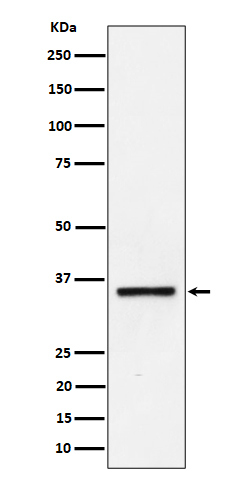
| WB | 咨询技术 | Human,Mouse,Rat |
| IF | 咨询技术 | Human,Mouse,Rat |
| IHC | 1/100-1/200 | Human,Mouse,Rat |
| ICC | 技术咨询 | Human,Mouse,Rat |
| FCM | 咨询技术 | Human,Mouse,Rat |
| Elisa | 咨询技术 | Human,Mouse,Rat |
| Aliases | BSP1; hK8; HNP; HPN; Kallikrein8; Klk8; NRPN; PRSS19; TADG14; UNQ283;;Kallikrein 8 |
| WB Predicted band size | Calculated MW: 28 kDa ; Observed MW: 35 kDa |
| Host/Isotype | Rabbit IgG |
| Antibody Type | Primary antibody |
| Storage | Store at 4°C short term. Aliquot and store at -20°C long term. Avoid freeze/thaw cycles. |
| Species Reactivity | Human |
| Immunogen | A synthesized peptide derived from human Kallikrein 8 |
| Formulation | Purified antibody in PBS with 0.05% sodium azide,0.05% BSA and 50% glycerol. |
+ +
以下是3篇关于Kallikrein 8(KLK8)抗体的参考文献及其摘要概括:
1. **文献名称**: *Human kallikrein 8 (hK8) is overexpressed in ovarian cancer cells and is detectable in the serum of patients with ovarian cancer*
**作者**: Shvartsman HS, et al.
**摘要**: 该研究开发了针对KLK8的单克隆抗体,发现其在卵巢癌组织中显著高表达,并通过免疫组化验证。研究还表明,卵巢癌患者血清中KLK8水平升高,提示其作为潜在诊断标志物的可能性。
2. **文献名称**: *Kallikrein-related peptidase 8 (KLK8) is a novel serumin biomarker for breast cancer*
**作者**: Paliouras M, et al.
**摘要**: 作者利用KLK8特异性抗体进行ELISA检测,发现乳腺癌患者血清中KLK8浓度显著高于健康对照组,提示KLK8可能作为乳腺癌的新型非侵入性生物标志物。
3. **文献名称**: *Kallikrein 8 is involved in the pathogenesis of Alzheimer’s disease via aggregation of amyloid-β*
**作者**: Yoshida S, et al.
**摘要**: 研究通过免疫印迹和免疫荧光技术(使用抗KLK8抗体)发现,KLK8在阿尔茨海默病患者脑组织中异常聚集,并与β-淀粉样蛋白相互作用,可能参与疾病进展。
4. **文献名称**: *Production and characterization of monoclonal antibodies specific for human kallikrein 8*
**作者**: Shigemasa K, et al.
**摘要**: 该文献详细描述了针对人KLK8蛋白的单克隆抗体的开发与验证,包括抗体的特异性检测及其在组织样本中的定位应用,为后续功能研究提供工具支持。
以上文献均聚焦于KLK8抗体的开发与应用,涵盖癌症诊断、神经退行性疾病机制及抗体技术方法学。
Kallikrein 8 (KLK8), also known as neuropsin, is a serine protease enzyme encoded by the *KLK8* gene and belongs to the tissue kallikrein family of peptidases. It is primarily expressed in the central nervous system, skin, and endocrine tissues, where it plays roles in synaptic plasticity, learning, memory, and epidermal homeostasis. KLK8 is implicated in cleaving extracellular matrix proteins and activating signaling pathways through protease-activated receptors (PARs). Dysregulation of KLK8 has been linked to neurodegenerative disorders (e.g., Alzheimer’s disease), epilepsy, and cancers, particularly gliomas and hormone-dependent tumors.
Antibodies targeting KLK8 are critical tools for studying its expression, localization, and function. These antibodies are typically developed in immunized hosts (e.g., rabbits or mice) using recombinant KLK8 protein or peptide antigens. They enable applications like Western blotting, immunohistochemistry, and ELISA to quantify KLK8 levels in tissues or biofluids. Specificity validation via knockout controls or blocking assays is essential due to homology among kallikrein family members.
Research-grade KLK8 antibodies aid in exploring its role in disease mechanisms, such as tumor invasiveness or neuroinflammatory pathways. Some therapeutic antibodies are under investigation for targeting KLK8 in cancer or neurological conditions. Commercial availability and cross-reactivity across species (human, mouse, rat) vary, requiring careful selection for experimental models. Overall, KLK8 antibodies are pivotal for advancing biomarker discovery and therapeutic strategies in neurology and oncology.
×